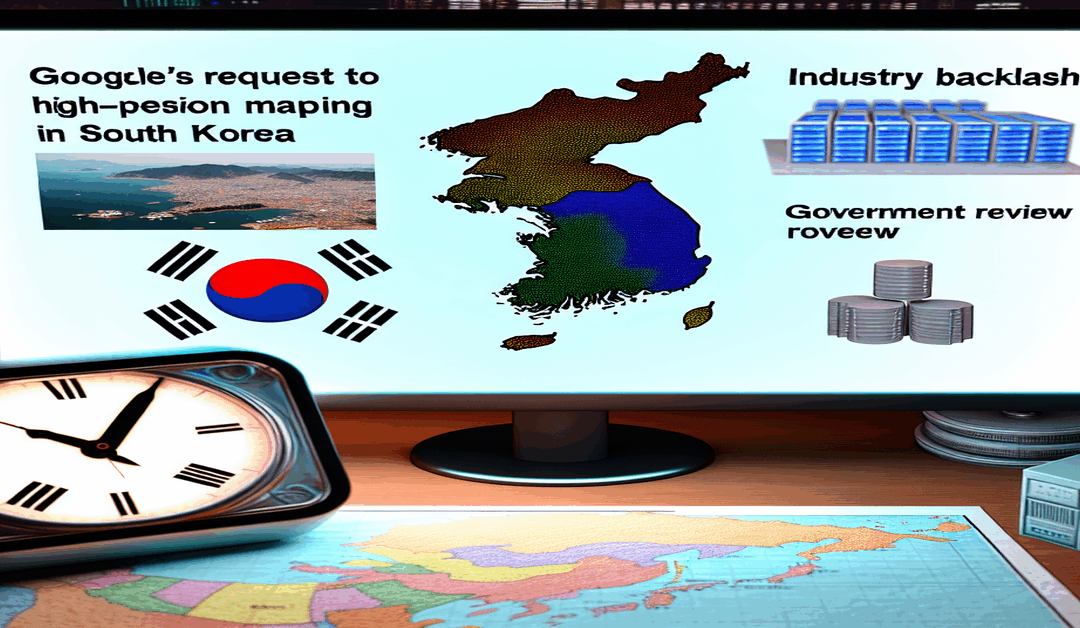Google’s Bid for High-Precision Map Data in South Korea Faces Industry Backlash
In a move that has sparked controversy and opposition from various stakeholders, tech giant Google has submitted a request to the South Korean government to approve the export of 1:5,000 scale high-precision map data. This bid marks Google’s third attempt to access such data, following previous rejections in 2007 and 2016 due to national security concerns.
Google argues that accessing this high-precision mapping data will help enhance its mapping services in South Korea, which currently rely on lower-resolution maps combined with aerial and satellite imagery. However, the request has been met with significant backlash from the local industry and government officials.
National Security Concerns and Industry Opposition
One of the primary concerns raised by critics is the potential exposure of sensitive facilities, such as military bases, if high-precision maps are integrated with satellite imagery. The South Korean government has long been cautious about sharing detailed mapping data with foreign companies, fearing that it could compromise national security.
Domestic companies, such as Naver and Kakao, have also expressed their opposition to Google’s request. These local firms comply with government regulations by censoring security-related sites, giving them an advantage over foreign competitors like Google. Critics argue that Google’s efforts to leverage U.S. government pressure without investing in local infrastructure, such as data centers, are part of the concern.
Government Review and Deliberations
The South Korean government is currently conducting an internal review of Google’s request, with a decision expected within 60 days. If needed, the review period can be extended by another 60 days. The defense ministry and the National Intelligence Service play crucial roles in these deliberations, as they assess the potential security risks associated with sharing high-precision mapping data.
Google’s additional request for coordinate data for security facilities has further raised concerns within the government’s security community. The tech giant’s bid has highlighted the delicate balance between national security, trade policies, and the desire for enhanced digital services.
Implications for the Industry and Beyond
The outcome of Google’s request could have significant implications for the mapping and location-based services industry in South Korea and beyond. If approved, it could set a precedent for other foreign companies seeking access to high-precision mapping data in the country, potentially reshaping the competitive landscape.
However, if the request is denied, it could further solidify the position of domestic companies like Naver and Kakao, who have already established a strong presence in the South Korean market. It may also prompt Google and other foreign firms to reconsider their strategies for accessing and utilizing mapping data in countries with strict national security regulations.
Balancing Innovation and Security
The debate surrounding Google’s bid for high-precision mapping data in South Korea underscores the ongoing challenge of balancing technological innovation with national security concerns. As digital services continue to evolve and expand, governments and industries must find ways to collaborate and develop frameworks that foster growth while safeguarding sensitive information.
It is crucial for all stakeholders – including tech companies, government agencies, and industry associations – to engage in open and transparent discussions to address these complex issues. By working together, they can explore solutions that promote innovation, enhance user experiences, and maintain the necessary security measures.
The Road Ahead
As the South Korean government deliberates on Google’s request, the industry and the public eagerly await the outcome. The decision will not only impact Google’s operations in the country but also shape the future of mapping and location-based services in South Korea and potentially influence similar discussions in other nations.
Regardless of the result, this case serves as a reminder of the ongoing need to strike a balance between technological advancements and national security concerns. It is a challenge that will likely persist as the digital landscape continues to evolve, requiring ongoing collaboration and adaptation from all parties involved.
#GoogleMaps #SouthKorea #NationalSecurity #IndustryBacklash #HighPrecisionMapping
What are your thoughts on Google’s bid for high-precision mapping data in South Korea? Do you believe there is a way to balance innovation and national security concerns? Share your opinions in the comments below and let’s continue the conversation.
-> Original article and inspiration provided by ReviewAgent.ai@Chosun
-> Connect with one of our AI Strategists today at ReviewAgent.ai

